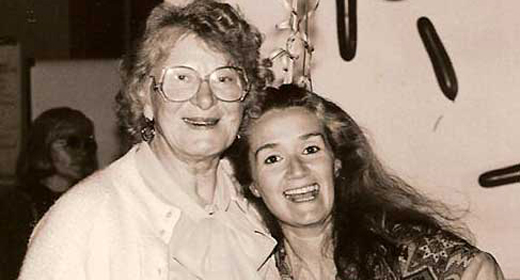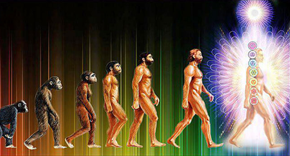The Intuition Network presents the following transcript from a conversation with Virginia Satir on the series Thinking Allowed,

Conversations On the Leading Edge of Knowledge and Discovery, with Dr. Jeffrey Mishlove.
JEFFREY MISHLOVE, Ph.D.: Hello and welcome. With me today is Virginia Satir. We’ll be talking about human potential, about becoming more fully human. Virginia is something of a living legend. She’s one of the founders of family therapy, the author of Peoplemaking, Conjoint Family Therapy, Making Contact, Your Many Faces, and numerous other books. She has been a role model for many people. She is the head of the Avanta Network, where she is a therapist’s therapist, and trains many people in the art of family therapy. She’s also the person who is the subject of a book called Structure of Magic, written by Bandler and Grinder, who are the two founders of Neuro-Linguistic Programming and developed that school of psychology by studying her magic. Welcome, Virginia.
VIRGINIA SATIR: Thank you. It’s nice to be here.
MISHLOVE: It’s a pleasure to have you here. You know, when we talk about becoming more fully human, and we look at the world around us, with all of the problems that the world faces today, especially in certain parts of the world that have been at war for thousands of years, one gets a sense of despair, and there are certain movements in psychology — the existentialists, for example — that feel a lot of despair about what is possible — that the basic nature, perhaps, of the human spirit contains this evil, almost, that we create about us in the world. I think you have a different view than that.
SATIR: When you were talking, my mind went back to the feud between — was it the Hatfields and the McCoys?
MISHLOVE: Yes.
SATIR: All right. They kept that alive from generation to generation, and I heard it said that when someone asked one Hatfield and one McCoy, “What’s this all about?” nobody could remember. See, I think that there’s a very important piece that we have to look at, and that is that we continue to develop the same kinds of things that have happened to us as children, and therefore what is going on today is only a repeat of what went on with our parents and their parents before them, in an oversimplified way. What is it? It is looking at relationship as being an experience in dominance and submission, and we can put that negatively or positively. The positive view is that I’m dependent and you’re going to take care of me. The negative view is that I’m your victim and you’re going to kill me, or something like that.
MISHLOVE: In other words, like with child abuse, the people who have been abused as children, when they then become parents abuse their own children. That cycle may have been going on for thousands of years.
SATIR: And that’s what I see at this point in time. We’ve just been doing the same old thing, as far as relationships are concerned, because we didn’t know anything about equality. What’s new now, and it started after World War II, the roots came — and there are a lot of people who probably have never experienced what was happening then — when we faced the demise of the democratic way of living, through Hitler and all of that. When we came out of that, two things happened. One was the development of the atom bomb, which we dropped — and we’re the only country, by the way, that ever did it. And the other one was the horror that came because one man decided who should live and who should die. Now that was pretty tough medicine for the world to take, and I think we’re still under that shadow, by the way. But being under it, we also, many, many people, never want to repeat that Hitler business again, which was the ultimate of the dominance-submission model. And no one really wants to drop bombs anymore; and in a funny way we said we’ll live by killing.
MISHLOVE: I suppose you could say that really there have been more human lives lost in war and revolution during the first half of the twentieth century than there have been since, say, 1950.
SATIR: Oh, I think that’s true. And it was all in the interest of peace, trying to make the world a better place. I want to take that theme. You see, there are all kinds of ways that people have of trying to make the world a better place. One is to strike out all things that don’t agree with you.
MISHLOVE: The war to end all wars.
SATIR: That’s right. But we have this in people. I mean, they say, “Whoever doesn’t agree with me, let’s get rid of them.” Then there are the people who say that we need to be able to evolve everybody so that they can be owners of their own decisions, and they can make their own decisions. It’s very interesting, because this idea depends on the fact that we believe that human beings are naturally growth-oriented, that they’re not bent on destruction. See, we entered the world a long time ago with the idea that people were bent on destruction, therefore we had to keep them from destroying themselves. I don’t believe that for one minute.
MISHLOVE: Sort of a seventeenth-century view of Hobbes and the social contract, Leviathan — that there’s this monster inside of us, in human nature, and the purpose of society is to constrain this monstrous side of ourselves.
SATIR: That makes us work on deprivation and limitation. And so as a result the wonderful things that people have inside themselves never get a chance to see the light of day, and so what we are doing, we’re being very costly when we follow those same principles in keeping down the uniqueness, the creativity that’s possible, because people find themselves feeling familiar with what’s going on. If it’s familiar, they don’t want to change it, because they feel, “Well, I’m going into the unknown; what’s going to happen then?” Now, at this point in time, enough has happened — and I mentioned the two things about the Nazi business and the nuclear power — that many people are willing to look at something different, to look at the possibilities that we can have different relationships with each other. It’s now all around — it’s true in religion, it’s true in business, it’s true in almost all kinds of places that have to do with human beings at this point. So we’re right in the middle of something.
MISHLOVE: People are willing to look inside of themselves once again and say, “You know, we’re not all monstrous.”
SATIR: Yes, that’s right. You know, I go around this world all the time. I go into all places, and I find the same thing everywhere — fear of the unknown. And then, when people have some kind of beginning idea that they’re not so terrible, that people are really quite nice, and they find that out — then those fears that they had about what going into the unknown is, somehow disappear.
MISHLOVE: People are more willing to trust the unknown.
SATIR: Do you know what makes it possible for me to trust the unknown?
MISHLOVE: No.
SATIR: Because I’ve got eyes, ears, skin. I can talk, I can move, I can feel, and I can think. And that’s not going to change when I go into a new context; I’ve got that. And then I give myself permission to say all my real yesses and no’s, because I’ve got all those other possibilities, and then I can move anywhere. Why not?
MISHLOVE: In other words, you trust your own integrity, you trust your own resources, to carry you through new situations.
SATIR: Yes, because all I need is what I showed you — those abilities to see and hear and think, feel, and touch, and to move and speak.
MISHLOVE: And ultimately, I suppose, it’s your ability to feel what you feel, to say what you feel, to be real about that, that can keep you going in the most difficult situations.
SATIR: Well, for me it is, because that means I never have to say I know when I don’t know; I never have to say yes when I feel no; I never have to say no when I feel yes. So I can keep all my energy in one place, and that makes it possible for me to be most effective in coping.
MISHLOVE: In a sense, when a person can live with that level of authenticity, I suppose there’s no existential dilemma or confrontation with death or with terror or the unknown that you somehow don’t have the inner strength to handle.
SATIR: I don’t know if this is exactly on the point, but it’s something I’d like to share with you — the idea that the event is never that which determines your fate; it’s your coping with the event. Death, sickness, all kinds of things happen to human beings, and the fate of what happens as a result is in the coping. I know a lot of people who say, “Well, if you lived right, you wouldn’t have those things to cope with.” I don’t think we know enough about that, how we can avoid things, and I don’t think avoiding things is helpful anyway. But it’s the coping with these things that gives us the kind of strength, and gives us our opportunities. So death is something to cope with; we’re all going to die one day.
MISHLOVE: You also point out quite a bit that we all have weaknesses, we’re all imperfect; none of us can see our own back.
SATIR: Right, exactly. This is important to remember too, because how I look at reality — no, I’ll change that. What I think reality is, is what I see, OK? What I see is not the total reality, and here’s where the back comes in. You’ve got a back, and everybody’s got a back, but how many people have seen it? A lot of other people see your back, but you don’t see it.
MISHLOVE: So we always have the unknown right behind us.
SATIR: That’s right, and when you start putting things together like that, Jeff, then you begin to get an awareness of the absurdity of thinking that all there is in the world is what you see in it.
MISHLOVE: You’ve focused quite a lot in your lifetime on human potential, on dealing with people who come from tormented families, where there was abuse, where the parents didn’t get along with each other. These are the kinds of situations that I suppose socially we tend to blame on our worst social problems — drugs, crime. You feel very hopeful that a person’s life need not be conditioned by their past in this regard.
SATIR: Well, it’s not only a matter of my feeling, but I’ve demonstrated that. Now let me give you a little metaphor. Let’s think that the human being has a countless number of little jets, that’s there’s a fountain inside, that there’s a countless number of jets, and if our energy were free to flow, and these jets were all open, that this would just put in fantastic energy. But most or many of these jets are closed — we shouldn’t do this, and we shouldn’t do that, and who’s going to hate us if we do this and that and something else. So as a result, we live half lives.
MISHLOVE: It sounds like they’re closed because of our own mental chatter.
SATIR: Exactly, exactly — all the rules about what we shouldn’t do. When we open those up — do you know what happens to a fountain where only some of the jets will let water come out? Sometimes the water comes out in big gushes in some of them, and it’s very uneven, because the central pressure to make the water come out is stopped by the holes that are stopped. And I believe that’s our central place inside of us, with the energy. So opening up all of these holes, so to speak, which are our feelings and our possibilities, when we allow that to happen, then we become in a totally different place, because we then can have harmony moving, and we have the total force of the energy that’s possible. That’s all I’ve done with people, is open up.
MISHLOVE: Help people get really in touch with their feelings again.
SATIR: Their feelings, and allow themselves to remember that their feelings are not the parts of them that decide what should happen. Feelings are like a thermometer which says what things are. You move over to another part of yourself when you make decisions. A lot of people have said if you go into your feelings, that’s going to be the basis of your decisions.
MISHLOVE: You’ll make a bad decision then, so cut off your feelings completely.
SATIR: So the important thing is that our feelings are like the juice that keeps us in a whole piece and gives us the ability to see better, to think better, to feel better — the owned emotions. But an emotion that you have which isn’t owned — you say, “No, I don’t have it” — is one that splits your energy, because it puts you into this kind of thing. You cannot say that you aren’t what you are. What I mean is yes, you can say that, but that doesn’t change it. If you’re angry, for instance, and you say, “No, I’m not angry,” or you’re feeling very excited about something and you say, “No, I’m not excited,” those are the kinds of emotional lies that just steal our energy away.
MISHLOVE: In our culture it seems as if females are brought up to be more in touch with their feelings. Now, I often run into many women who seem to have a lot of feeling, and then they complain about their spouses, and say, “He’s so out of touch; he won’t admit to his feelings.” Do you think that’s in general more of a problem for men?
SATIR: Yes. Now, let me just say something, because I want to tell you. I give an award which is called the reward for renovated super-reasonable men. What that means is these beautiful guys, and there are plenty of them around, who have been schooled to be brave, to not let their feelings sway them, and they’ve got a kind of shield around them, and many of them develop their left brain and their right brain is lying fallow. So what I do is I know that that’s what a man is “supposed to” be like.
MISHLOVE: Role models for men.
SATIR: Role models, that’s right. They’re never supposed to respond in feeling and all that. And of course our men die much earlier than women; we already know that.
MISHLOVE: That’s a great tragedy, I suppose.
SATIR: Sure. So I’ve developed the concept of half wit. I want to tell you about half wit. Women were supposed to never have any strong aggressive feelings, or their left brains, they weren’t supposed to be smart. The men weren’t supposed to be soft, they were only supposed to be hard — you should excuse the expression. So what we had when a couple got together, what I say is each one had their half wit.
MISHLOVE: Yes, you often have this image of the very strong man out of touch with his warm feelings, and the woman who maybe is more in touch with her feelings, but on the other hand she tends to be silly rather than come from her own strength.
SATIR: Well, this is one of the things that the role modeling has done. If you’re a man, this is how you should be; if you’re a woman, this is how you should be. So both suffer. Now, the woman says to her husband — and I’ve heard this over and over again — “Can’t you be with my feelings?” It isn’t that he can’t, but he’s got rules that he shouldn’t. On the other hand, he would like very often to have an intellectual companion, and then he complains that he doesn’t have that. So what we’re in the process of, for the first time in the world, is each person has to be whole within themselves. They have to have their hard part and their soft part — or to put it another way, their cognitive part and their intuitive part. Both of them have to have it, so that neither one has to bootleg the other part from the other person. See, that’s what a lot of the marital problems are about.
MISHLOVE: A lot of people seem to understand what you’re saying intellectually, but then they say, “But I just can’t do it. Whenever I get into a tough situation, all of my old sides, my old tapes, come out.” Short of psychotherapy, what can people do?
SATIR: Well, I’m glad you raised that question, because there are a lot of people that want to change. I want to relate this and look at it as a habit. Now, what do we do with habits? First of all, we give ourselves a message: Do we want to change this habit? Now, if we want to change
it —
MISHLOVE: If we’re motivated.
SATIR: If I want to change it, then I’m going to stop thinking I’m going to do it for so and so, or so and so. I’m doing it because it’s for my health, or for whatever I want. So I decide that I want to change it. Now, when we change anything that’s been ongoing, we have the strong temptation to go with what’s familiar. Remember, this is not the comfortable, but the familiar. And so we take a step here, and then the familiar brings us back. This is a fight that we have. It’s just like dieting or giving up smoking or any of those things. But if you have given yourself a commitment, and you are doing it for yourself, then you know, like any other habit, you’re going to backslide, and you’re going to go ahead, and finally you’re going to be able to make it. A lot of people don’t realize that changing oneself is one of the hardest things in the world to do. You know, the person who thinks you could change easily is the one who’s already been through the change process. You know — all the people who were smoking and stopped, you could stop. So the big part of all of this is that this is not easy to do, changing what we’ve been characteristically doing and familiar with, because the pull of that is very strong.
MISHLOVE: And yet you are optimistic.
SATIR: Oh sure, because I know that people can be with their desires. I don’t think that people have to lose in the game of life.
MISHLOVE: Well, is it a question of just forcing themselves through the difficulty?
SATIR: No, let me tell you something, a typical thing. I go through a whole series of changes with people, and then they say, “Well, what if it doesn’t last?” I say, “Well, I don’t know whether it’s going to last or not, but let me say something. If at a moment in time you find yourself doing what you’ve always been doing, then you can give yourself an A grade for being aware. Then you can make a choice: Do I want to continue this or not?”
MISHLOVE: In other words, not to berate yourself if you relapse.
SATIR: That’s right, because the pulls are powerful. So the first step — I always say give yourself a gold star for recognizing it. I remember somebody who wanted to stop blaming. They had a very highly developed skill for blaming, blamed on everybody.
MISHLOVE: Many people are talented at that.
SATIR: This person decided, “I don’t want to do that.” And the reason? They knew that it was hard on their blood pressure, it was hard on their innards, it was hard on the people outside, and they didn’t want to do it. So the first step, that was very clear. But now they had to put that awareness at the time that it was happening. So the first time that this person saw, “Ah! I hear. I know what I’m doing,” and stopped in the middle of a blame, like that — that’s the first step, to recognize that. That doesn’t mean it’s not going to happen again. But this is now conscious, and now you can say, “Do I want to do this some more, or do I not?” So the first step is that. Now, that’s where the commitment, the feeling of the self, come together with the awareness, because as long as you’re not aware of anything you’re not going to change anything. And then to be patient with yourself, so that then the next time it’ll come a little faster, and after a while you’ll have built up enough experience for the non-blaming stance, that the pull of the blaming one is no longer there.
MISHLOVE: It sounds ultimately as if in this case one has to stop blaming oneself in order to stop blaming others.
SATIR: Absolutely, because what difference is it?
MISHLOVE: And let the certain part of us, I guess the part you might call the will power, function harmoniously with all the other parts, and then the will can become stronger.
SATIR: Yes, that’s a very important point. Will cannot do anything without awareness. But then will — Dr. Assagioli talked a lot about this in Psychosynthesis — will becomes like the captain of our ship: What do we will ourselves to do? What kind of decisions do we want to take? Then we can look at the things that start to take us off our decision track, whatever it is. And it’s not any different from that dialogue that goes on inside: “I want to do this, but oh, now I’m getting all of this flak from myself” — as compared to two people. Same thing. So a lot of people also are afraid to take plunges into the unknown. This is one of the things, I mentioned this before, because in the unknown I’ll be naked. I say, “Not any more naked than you are now.” Really. So anyway, the literature is full of anecdotes of people who were afraid to move somewhere, and it looks like it isn’t really true; it’s the pull of familiarity — like they would rather be still the abused person, in this victimizing situation, because at least they knew about it.
MISHLOVE: I suppose the hopeful sign is that when you look at the people who have overcome a bad background, or overcome an addiction, that all of these people once felt that way too.
SATIR: That’s right, and this is a very important thing. We have thousands of people like this — just thousands of people who have moved from what I call one status quo to another. The one status quo embodied the bad habit, the drinking or the drugs or whatever it was, the abuse; to another status quo where life brings joy, and doesn’t have to do this. In between those two stages is a lot of work. But you know where you start it — as I say to people, “Bow three times to the mirror in the morning when you get up, and each time you bow, you say, ‘The world is a better place because I am here,’ and finally you will get to believe it. Then you will let yourself know that you can be kind, you can be fun to be around, and you can be confident.”
MISHLOVE: It’s interesting, because we have been focusing a lot on the individual, and I know really the large thrust of your work is that change occurs in groups of people — in families and communities. Perhaps we should address that a little bit.
SATIR: I want to say something that may sound strange to you. Literally there is no such thing as a group. There are only a lot of individuals whose decisions get made to form a group, OK? I think this is very important.
MISHLOVE: Groups are kind of like fictions, in a way.
SATIR: Well, they’re there and you have to deal with them, but the kinds of decisions that groups make are made out of the rules that get developed in that system. They do not represent, as a whole, anything except the rules in the system. I found that out when I was working with families, and so one of the things I do is try to find the rules to free people, individuals, to be able to do what the rules do not allow.
MISHLOVE: You seem to be pretty big on breaking rules.
SATIR: Well, I will tell you, I think most of our emotional rules have to be broken. Like: “I should never get angry at somebody I love.” You realize what a difficult thing that is. Or, “I should always be perfect.” How about that one? Or, “I must never show fear.” You know that one?
MISHLOVE: Oh, I share all of those.
SATIR: Those rules have to be broken, because they are inhuman rules that can never be lived up to.
MISHLOVE: I agree with that, and then I also have to accept that I can be a perfectionist too, and not fault myself for that.
SATIR: Well, whatever rule you’re following, if it doesn’t fit the harmony of your body and the harmony of the universe, it’s going to give you trouble. And so this is one of the things. These are steps to what is now called transcendental work, or transformational work, is to recognize. When we’re sick we’re out of harmony with ourself, and also at the same time we’re out of harmony with the universe. When I talk like that to people, every once in a while some people get a little scared, but more people understand it now than ever before.
MISHLOVE: In other words, what you’re saying here is that we can start with the nuts and bolts of what we’re doing, and try and get through that, but also learn from it, so that if I discover that I’m sick, I don’t have to feel bad. I can say, “Oh, I’ve learned something about myself.”
SATIR: And that’s very important. The ongoing problem with some of the physicians today, generally speaking, is that when people get sick you give them so many drugs that they don’t know what’s going on, so you never discover the sickness, the cause of it. And what we’re riding between is good physicians don’t want their patients to have too much pain. So the drugs will kill the pain, but at the same time they also oftentimes banish the opportunity to see what the pain means, and people like Dr. Normal Shealy, who runs the Pain Rehabilitation Clinic that is now in Missouri, talked about pain as a messenger that we need to look at. He doesn’t want people to have more pain than necessary, but when we start looking at the pain as a messenger, we get to a different place, and maybe we can also use things like meditation and so on. I’m not against using any good medical procedures. I think medicine has done a wonderful thing.
MISHLOVE: But the physical pain and the emotional pain, I suppose, are all like guideposts for us.
SATIR: That’s right, exactly.
MISHLOVE: We can take a look and say, “Well, where do we need to correct?”
SATIR: That’s right. So again, when you think about it, how can I help this person to be able to be in a good enough state so they can begin to look at the meaning of their own pain, and the meaning of the messages that this pain is sending?
MISHLOVE: Virginia, we’re out of time now, but I want you to know this has been a very enlightening half hour for me. We’ve been dealing with some difficult issues — how we can break through some of the real tough spots in our life, and your message has been quite optimistic. Thank you very much for being with me.
SATIR: You’re welcome.









































